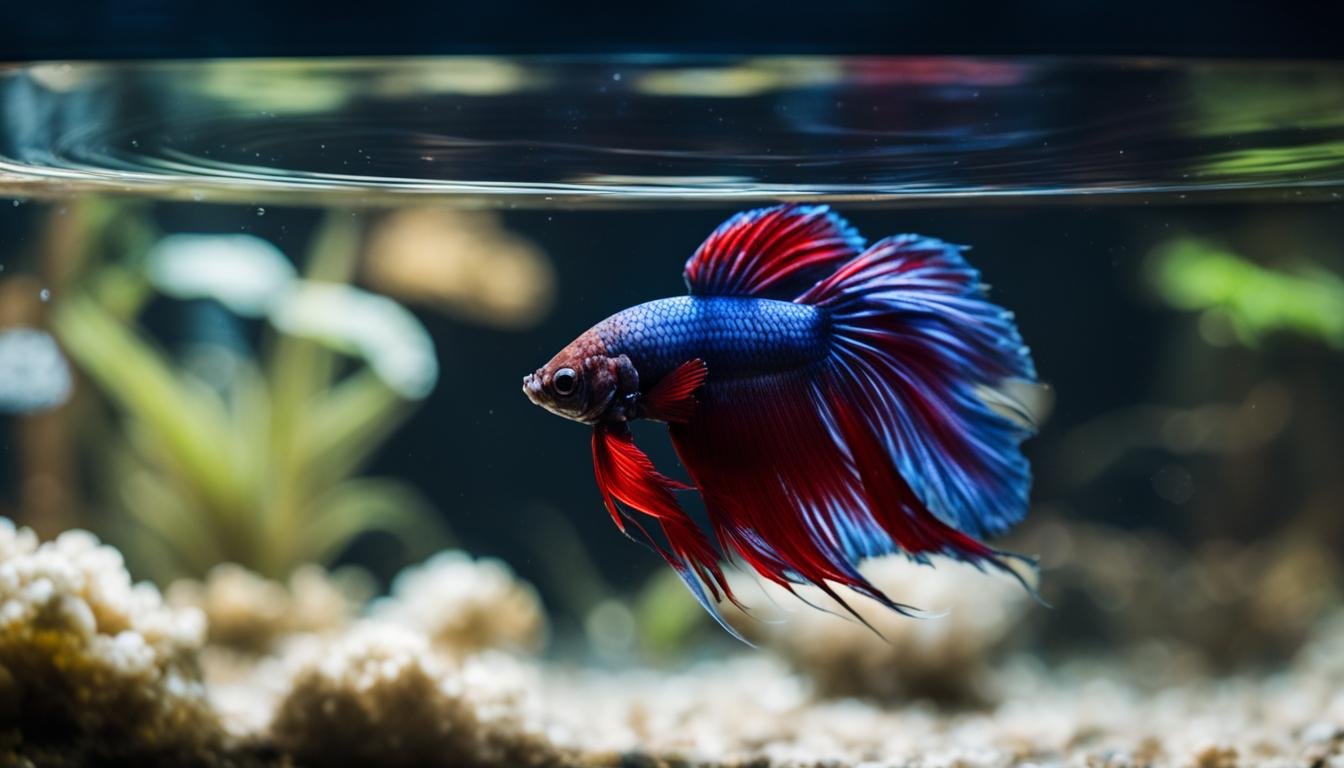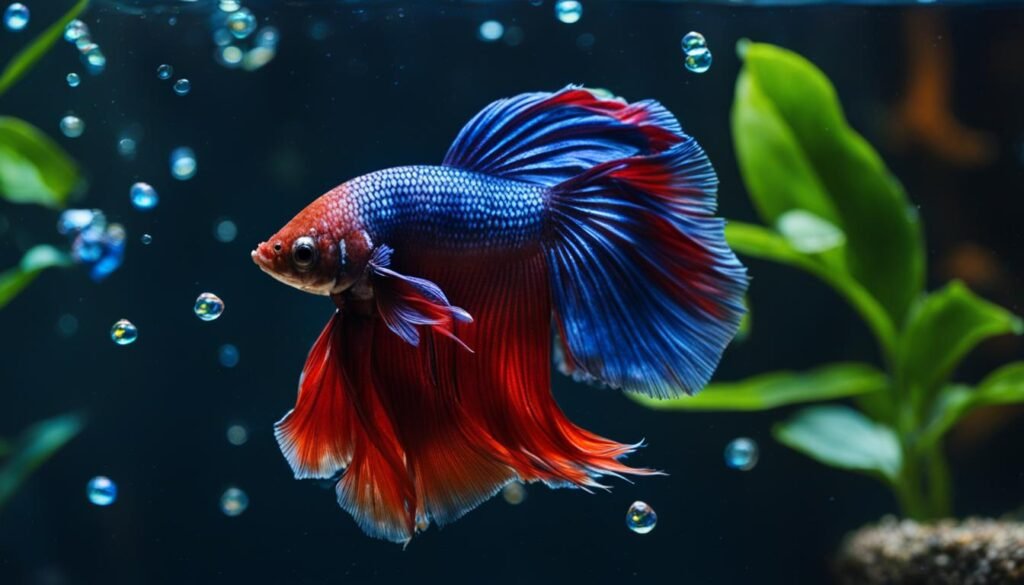Your cart is currently empty!

Understanding Betta Fish Behavior: Do Betta Fish Play Dead?
Betta fish are known for their beautiful colors and vibrant personalities. However, there is one behavior that often leaves fish owners puzzled – playing dead. Many people wonder if betta fish actually feign death or if it’s just a myth. In this article, we will explore the truth behind this fascinating behavior and provide insights into understanding your betta fish’s actions.
Key Takeaways:
- Playing dead is a natural behavior of betta fish and is not a sign of illness or distress.
- Betta fish play dead as a defense mechanism to avoid potential predators and conserve energy.
- It’s important to distinguish between a betta fish playing dead and a betta fish experiencing serious health issues based on their movement and physical appearance.
- Tank conditions can influence betta fish behavior, including their tendency to play dead. Providing a suitable environment is essential.
- By understanding their behavior and providing proper care, you can enhance the well-being and happiness of your betta fish.
Signs of Playing Dead vs. Serious Health Issues
When it comes to betta fish playing dead, it’s important for fish owners to be able to distinguish between this natural behavior and serious health issues. By recognizing the signs, you can ensure the well-being of your fish and provide appropriate care.
Signs of Playing Dead:
- Upside-down floating
- Appearing lifeless
- Floating near the water’s surface
- Moving gills, indicating breathing
If your betta fish exhibits these signs, it is likely just playing dead as a defense mechanism to avoid potential predators or conserve energy.
Signs of Serious Health Issues:
- Dull appearance
- Discolored fins
- Difficulty moving or swimming
- Non-moving gills
If your fish shows these signs, it may be indicative of a health problem, and professional help from a veterinarian or aquatics professional should be sought.
Understanding the Difference
Recognizing the contrast between betta fish playing dead and serious health issues is crucial in providing the appropriate care for your fish. Pay attention to their behavior, breathing, and physical appearance to make an accurate assessment. By understanding the signs, you can ensure the well-being of your betta fish and address any health concerns promptly.
The Science Behind Betta Fish Playing Dead

Understanding the behavioral patterns of betta fish is key to unraveling the science behind their fascinating behavior of playing dead. This unique behavior serves as a defense mechanism for bettas in the wild, allowing them to blend in with their surroundings and avoid potential predators. When a betta fish plays dead, it may float upside down or near the water’s surface, giving the appearance of lifelessness. However, it is important to note that bettas are still very much alive during this time, with their gills actively moving to ensure oxygen intake.
What drives this intriguing behavior? Betta fish primarily play dead to conserve energy and rest. By pretending to be lifeless, they can lower their activity levels and reduce the risk of attracting attention from predators. This instinctual behavior helps bettas survive in their natural habitats, where resources may be scarce and the ability to rest and recover is essential for their overall well-being.
Additionally, playing dead can be a response to stress or a way for bettas to avoid certain environmental factors. Like humans, fish can experience stress, and playing dead allows them to temporarily escape from potential stressors. Whether it’s due to disturbances in their tank or interactions with other fish, bettas may resort to playing dead as a means of coping and protecting themselves.
Betta Fish Behavioral Patterns
- Betta fish play dead as a defense mechanism to avoid predators.
- Playing dead helps bettas conserve energy and rest.
- Stressful situations may trigger the play dead behavior in bettas.
By understanding the science behind betta fish playing dead, fish owners can provide a suitable environment that caters to their natural instincts and needs. Creating a stress-free tank, with ample hiding spots and proper filtration, can help minimize the need for bettas to resort to playing dead. Observing their behavior and responding promptly to any signs of distress or health issues is crucial in ensuring the well-being of these captivating creatures.
How to Recognize Betta Fish Playing Dead
Recognizing when a betta fish is playing dead is essential for fish owners to prevent unnecessary worry or confusion. While this behavior may initially appear alarming, understanding the distinct signs can help differentiate between a betta fish playing dead and a fish in distress or ill health.
Signs of a Betta Fish Playing Dead:
- The fish may float upside down or near the surface of the water.
- The gills will still be moving, indicating that the fish is breathing.
If these signs are observed, it is likely that the betta fish is playing dead and not experiencing any serious health issues. It’s important to note that betta fish play dead as a defense mechanism to avoid potential predators and conserve energy.
Signs of a Betta Fish in Distress or Ill Health:
- The fish appears lifeless with no signs of breathing.
- The fish displays discolored fins or struggles to move.
If any of these signs are present, it is crucial to seek the assistance of a veterinarian or aquatics professional to address the betta fish’s health concerns promptly.
The Impact of Tank Conditions on Betta Fish Behavior

Creating a suitable tank environment for betta fish is essential for their overall well-being and can have a significant impact on their behavior, including their tendency to play dead. Poor tank conditions can cause stress and discomfort for betta fish, making them more prone to exhibit behaviors like feigning death. To ensure a healthy and thriving betta fish, it is important to consider the following factors when setting up their tank:
Adequate Tank Size
Betta fish require a spacious tank to swim and explore. A tank that is too small can lead to stress and restricted movement, increasing the likelihood of playing dead behavior. Aim for a tank that is at least 5 gallons in size to provide ample space for your betta fish to thrive.
Proper Filtration
A good filtration system is crucial to maintain water quality and prevent the buildup of harmful toxins. Poor water quality can stress out betta fish and contribute to their playing dead behavior. Invest in a reliable filter that is appropriate for the size of your tank and perform regular maintenance to ensure optimal water conditions.
Regular Water Maintenance
Regular water changes are necessary to keep the tank environment clean and healthy for betta fish. Aim to change about 25-30% of the water every week and monitor the water parameters closely. This will help prevent the accumulation of toxins and maintain stable water conditions, reducing stress and the likelihood of playing dead behavior.
By providing a spacious tank, proper filtration, and regular water maintenance, you can create a comfortable and stress-free environment for your betta fish. This will help minimize the likelihood of them exhibiting playing dead behavior and ensure their overall well-being.
Treating and Preventing Betta Fish Playing Dead

Preventing and treating betta fish playing dead behavior involves creating a healthy and stress-free environment for the fish. By providing a suitable tank size, proper filtration, regular water maintenance, and a balanced diet, fish owners can help reduce the likelihood of this behavior. It is important to monitor the fish’s behavior and address any signs of stress or health issues promptly.
To prevent betta fish from playing dead, start by ensuring the tank size is appropriate. Bettas require a tank with at least 5 gallons of water to swim freely. A larger tank also provides more opportunities for hiding spots and enrichment, which can help reduce stress.
Proper filtration is essential for maintaining water quality. Invest in a high-quality filter that is suitable for the tank size and provides adequate circulation. Regular water maintenance, such as weekly water changes and monitoring ammonia and nitrate levels, will help prevent the accumulation of toxins that can stress the fish.
Key steps to prevent betta fish playing dead:
- Provide a suitable tank size with at least 5 gallons of water
- Invest in a high-quality filter for proper water filtration
- Perform regular water maintenance, including weekly water changes
- Monitor ammonia and nitrate levels in the tank
- Offer a balanced diet with high-quality betta fish pellets or frozen/live foods
- Observe the fish’s behavior and address any signs of stress promptly
If the betta fish is consistently playing dead or exhibiting other concerning behaviors, it is recommended to consult with a veterinarian or aquatics professional for further guidance. They can provide expert advice and help determine if there are any underlying health issues contributing to the behavior. Remember, proactive care and a suitable tank environment are key to ensuring the well-being and happiness of your betta fish.
The Fascinating World of Betta Fish Behavior

Betta fish are known for their unique and captivating behaviors, and one of the most intriguing is their ability to play dead. Understanding this play dead behavior in betta fish is key to providing them with the care they need. By delving into their behavioral patterns, we can gain insights into their fascinating world.
When betta fish play dead, it is not a sign of illness or distress, but rather a defense mechanism. By floating upside down or appearing lifeless, betta fish blend in with their surroundings and avoid potential predators. This behavior allows them to remain inconspicuous and conserve energy. It’s important to note that betta fish are intelligent creatures with the ability to learn tricks, recognize their owners, and even interact with toys. By understanding their behaviors, we can create a suitable and enriching environment that enhances their well-being.
The Role of Environment and Tank Conditions
The tank conditions play a significant role in a betta fish’s behavior, including their tendency to play dead. Stress caused by an unsuitable tank environment, such as a small tank, inadequate filtration, or poor water quality, can trigger this behavior. To prevent this, it’s crucial to provide a spacious tank with adequate hiding spots, proper filtration, and regular water maintenance. By creating a comfortable and stress-free environment, we can reduce the likelihood of betta fish exhibiting playing dead behavior.
Recognizing and Addressing Playing Dead Behavior
It’s important to be able to distinguish between a betta fish playing dead and experiencing serious health issues. When a betta fish is playing dead, their gills will still be moving, indicating that they are breathing and alive. However, if the fish appears dull, has discolored fins, or is struggling to move, it may be a sign of a health problem. In such cases, it is advisable to seek the help of a veterinarian or aquatics professional. Additionally, observing the fish’s behavior and physical appearance can help determine if it is playing dead or experiencing a serious issue.
Understanding the play dead behavior in betta fish and their behavioral patterns not only allows us to appreciate their uniqueness but also helps us provide them with the care they need. By creating a suitable environment and being attentive to their needs, we can ensure that our betta fish thrive and live happy, healthy lives.
Betta Fish Sleeping Habits

Understanding the sleeping habits of betta fish is essential for providing them with a comfortable and nurturing environment. While bettas may appear to sleep in unusual positions, it is completely normal for them to sleep upside down or near the surface of the water. This behavior is a result of their unique physiology and natural instincts.
Betta fish breathe air using a specialized organ called a labyrinth, allowing them to survive in oxygen-deprived environments such as stagnant water. When betta fish sleep, they often float near the surface or rest on plant leaves, utilizing the air layer that forms above the water’s surface. Sleeping near the surface allows them to easily access fresh air while conserving energy.
It is important to note that betta fish may also exhibit other sleeping positions, such as resting on the bottom of the tank or hiding in caves or plants. These behaviors are their way of finding a safe and comfortable place to sleep. Providing a variety of hiding spots and dimming the lights at night can help create a calm and secure sleeping environment for betta fish.
Factors Affecting Betta Fish Sleeping Habits
- Tank Conditions: The size of the tank, water quality, and temperature can impact the quality of sleep for betta fish. A spacious tank with clean, well-maintained water and a stable temperature promotes better sleep and overall well-being.
- Lighting: Betta fish are sensitive to light, and excessive or bright lights can disrupt their sleep patterns. Providing a proper light cycle, including periods of darkness, allows bettas to establish a natural sleep routine.
- Tank Mates: The presence of tank mates can influence betta fish sleep. Some tank mates may cause stress or disturbances, leading to poor sleep quality. It is important to choose compatible tank mates and monitor their interactions to ensure a peaceful environment for sleep.
Betta Fish Sleeping or Dead: How to Tell the Difference

It can be concerning for betta fish owners to determine whether their fish is sleeping or deceased. Understanding the signs and behaviors can help differentiate between the two. Here are some key indicators to help you tell if your betta fish is sleeping or dead:
- Observing Breathing: When a betta fish is sleeping, it will continue to breathe, and its gills will move. Look closely for any signs of breathing or gill movement. If there is no movement or the fish appears lifeless, it may be a sign of death.
- Physical Appearance: Take note of the fish’s overall appearance. If it appears vibrant, healthy, and its fins are intact, it is likely sleeping. However, if the fish looks dull, has discolored fins, or shows signs of decay, it may be deceased.
- Behavior: Sleeping betta fish may rest near the surface of the water or in various positions, including upside down. They may also be less responsive to external stimuli during sleep. On the other hand, a dead betta fish will not show any signs of movement or response.
If you are unsure whether your betta fish is sleeping or dead, it is always advisable to consult with a veterinarian or aquatics professional for guidance. They can provide expert advice and help determine the best course of action.
Conclusion
Betta fish feigning death is a common and natural behavior that can often perplex fish owners. However, with the right knowledge and understanding, recognizing this behavior and distinguishing it from serious health issues becomes easier. By observing their fish’s behavior and physical appearance, fish owners can determine whether their betta fish is playing dead or experiencing distress.
Creating a suitable tank environment is crucial in preventing stress-related behaviors, such as playing dead. Providing sufficient space, proper filtration, and a balanced diet can significantly reduce the likelihood of betta fish exhibiting this behavior. Additionally, regular monitoring of water quality and prompt addressing of any signs of stress or illness can help maintain the well-being of betta fish.
Remember, recognizing and understanding betta fish playing dead is essential for responsible fish ownership. By being attentive to their needs and providing the right care, fish owners can ensure that their bettas live happy and healthy lives. So, if you ever spot your betta fish playing dead, rest assured that it is likely just a natural defense mechanism and not a cause for major concern.
FAQ
Do betta fish play dead?
Yes, betta fish have a unique behavior of playing dead. This behavior is a defense mechanism and a way for them to conserve energy.
How can I tell if my betta fish is playing dead or experiencing a health issue?
When a betta fish is playing dead, their gills will still be moving, indicating that they are breathing and alive. If the fish appears dull, has discolored fins, or is struggling to move, it may be a sign of a health problem.
Why do betta fish play dead?
Betta fish play dead as a defense mechanism to avoid potential predators. It also allows them to conserve energy and rest.
How can I recognize a betta fish playing dead?
A betta fish playing dead may float upside down or near the surface of the water. However, their gills will still be moving, indicating that they are breathing and alive.
How do tank conditions affect betta fish playing dead behavior?
Stressful tank conditions, such as a small tank, inadequate filtration, or poor water quality, can increase the likelihood of betta fish playing dead. Providing a suitable tank environment can reduce this behavior.
How can I prevent and treat betta fish playing dead behavior?
Creating a healthy and stress-free tank environment, including proper tank size, filtration, water maintenance, and a balanced diet, can help prevent and treat betta fish playing dead behavior.
What are some other fascinating betta fish behaviors?
Betta fish are intelligent and adaptable, they can learn tricks, recognize their owners, and even interact with toys.
What are betta fish sleeping habits like?
Betta fish may sleep in different positions and locations, including near the surface of the water. It is normal for them to sleep upside down or in unusual positions.
How can I tell if my betta fish is sleeping or dead?
When a betta fish is sleeping, their gills will still be moving, indicating that they are breathing. If the fish appears lifeless with no signs of breathing or movement, it may be a sign of death.
Can you summarize the main points about betta fish playing dead?
Betta fish play dead as a defense mechanism and to conserve energy. It is important to understand the difference between playing dead and a health issue. Tank conditions can also affect this behavior. Providing a suitable environment and monitoring the fish’s behavior are key to their well-being.
Leave a Reply